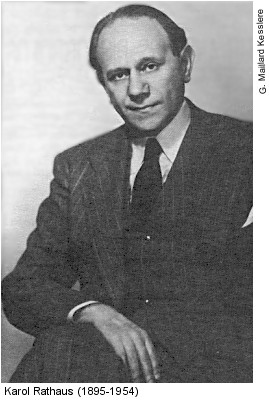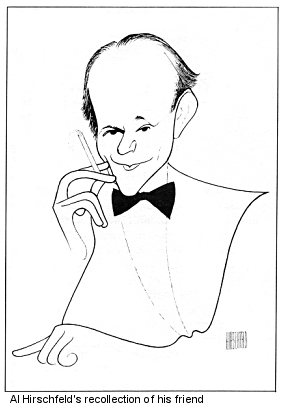|
The axiom that energy is indestructible was touchingly demonstrated at Queens College, C.U.N.Y. on November 2. A receptive audience showed up for a celebration on the founding of the Karol Rathaus Archive at The Aaron Copland School of Music.

Karol Rathaus was a composer and one of the many creative artists whose careers were jolted out of their predictable orbit by political developments in mid-century Europe. His productive life falls into three periods: early recognition, nomadic interlude, and final mission. It was during this last phase that he came to the newly founded (1937) Queens College in 1940, where he remained until his death in 1954 at the age of 59. It was his role in shaping standards and directions in the musical consciousness of college and community which made him such a unique asset and made his contribution indelible. A grateful Queens College had already named its music building after him and now, thirty years after his death, his manuscripts, correspondence, and other memorabilia were assured a permanent place at the institution which he served.
Rathaus was born in 1895 in Tarnopol, a town of Polish culture and language which, at that time, belonged to Austria. Among his teachers was Franz Schreker (who also taught Krenek and Alois Häba), then hailed in central Europe as one of the most important opera composers of the day. It was Schreker who brought the young Rathaus to the attention of Emil Hertzka, the visionary director of Universal Edition, a relatively new music publishing firm whose recent roster included the names of Bartok, Schoenberg, Berg, Weill, Krenek and others. In a 1955 monograph in The Musical Quarterly, the late Boris Schwarz — the distinguished scholar and musicologist who was Rathaus's friend and colleague — calls the composer's Second Symphony his first major success. Played at the 1924 Frankfurt Music Festival, it was alternately hailed and condemned as a "radical" work. The influential critic Walter Schrenk described Rathaus as "one of the strongest hopes of our new music," and the young man suddenly found himself with both a following and a solid reputation.
Among the conductors who performed his music were George Szell (The Last Pierrot) in 1927, Wilhelm Furtwaengler (Overture, Op 22) in 1928, and Erich Kleiber (Strange Soil) in 1930. Although the last-named work was Rathaus's only opera, its creation kindled in him a fascination with the theatre which he was to retain throughout his life. As late as 1953, on commission from the Metropolitan Opera, he prepared a revised orchestral score of Boris Godunov which rejected Rimsky's dazzling splendor in favor of Mussorgsky's darker aural concept. His own compositions included much incidental music to plays, ballets and films.
It was, in fact, as a composer for films that Rathaus may have earned his most widespread recognition before the storm clouds blackened over Europe and the world's agonies broke out in force. Among the great experimental film directors of the thirties to call on Rathaus were Fedor Ozep (The Brothers Karamazov, Amok, Dame de Pique) and John Brahm (Broken Blossoms, Let Us Live).
Rathaus's instinct for reality, for making connections, and for steadfastly refusing to be sucked into the false comforts of professional acclaim, stood him in good stead. While so much of Europe indulged ostrich-like in the fatal dream that things would get better, he sensed early what was to come. He, his wife Gerta and their infant son Bernt left Germany the year prior to Hitler's accession. They stayed in Paris for two years (1932-34) before moving on to London, where he wrote some of his most memorable works before his final emigration.
His name had preceded him. Hollywood soon sang its siren song and for a short while he lived there, forming new contacts and becoming acquainted with the vastly different ways and means of the New World. Katherine Cornell commissioned incidental music for a production of Herodes and Mariamne. His involvement in Jewish culture, first made manifest in the Habimah-commissioned scores to Uriel Acosta and The Merchant of Venice, surfaced again in two documentaries, Histadruth I & II. But Rathaus felt restless and out of place among the supercharged pragmatists of Hollywood. When the invitation came to join the faculty of Queens College, he was ready. He never looked back, and his new life among eager and youthful collegians was to become his great passion for the rest of his days.
And what an influence he was! Students and faculty alike looked upon this statuesque and striking figure as a true mentor. He had no patience with pretension and played no part in the parochialism of any closed circles. He felt his task as a teacher was to expose his students to as many components of musical totality as he could muster, in those mass-medialess days when music, by and large, still had to be made afresh each time to be heard. He was a prodigious pianist and keen musical analyst, totally at ease with all music, so long as it was good music. Schwarz recalled: "His warm smile, his genuine interest in other people, and his avoidance of self-discussion made him immediately likable. To his friends, he was a source of strength and courage — loyal, sincere, constructive in his criticism, perceptive in his judgments, and always intellectually honest. He hated pompousness; there was a streak of humor in him bordering on rascality, and he was not averse to practical jokes. His vitality and enthusiasm permeated his every work and gesture, and entered into his creative process."
It was perhaps as a setter of standards that Rathaus's role at Queens College was most significant. Truly cosmopolitan, he had spent his life among some of the great professionals in music on both sides of the Atlantic. No wonder he inspired such loyalty and respect from his colleagues and such unbounded enthusiasm from his students. The depth of his social and professional circles may now be plumbed by even a casual leafing through the archives. There one may find a 1939 wire from Roger Sessions (CAN YOU LUN WITH [Mark] BRUNSWICK AND ME THIS MONDAY TO PLAN WORK FOR A COMMITTEE ON PROGRAMS AND OPERA OF LEAGUE OF COMPOSERS ON WHICH I HOPE YOU WILL CONSENT TO SERVE); a program of the 1942 ISCM Festival in California at which the world premiere of Rathaus's Piano Concerto took place; a 1944 invitation to serve on the MENC's Committee on Contemporary Music in the U.S., other committee members including Henry Cowell, Samuel Barber, Aaron Copland, Morton Gould, Ferde Grofé, Howard Hanson, Otto Luening, William Schuman, William Grant Still and Virgil Thomson.

And letters. Folder upon folder of letters — Rathaus was a prolific correspondent at a time when correspondence was still a primary means of communication — from mortals and immortals. Painstakingly catalogued by librarian Joseph Ponte, the archives contain letters from theatrical producer and director Erwin Piscator and novelist Carl Zuckmayer; from composers Dallapiccola, Ross Lee Finney, Krenek, Hilhaud, Piston, Schoenberg, and Sessions (to name but a few); performers Raya Garbousova and Joseph Szigeti; musicologists Alfred Einstein, Karl Geiringer, Curt Sach, Oliver Strunk Edward N. Waters; conductors Goossens, Horenstein, Mitropoulos, Rodzinski ("Forgive me for answering your letter in English but my Chinese secretary did not yet learn Polish"), Rosenstock, Steinberg, Stokowski, and Bruno Walter.
The conductor Vladimir Golschmann wrote, on performing the Prelude for Orchestra: "There is so much I could say about a composition which expresses so much, so originally, and with such poetry in its perfect and concise form." Although Rathaus was known and admired on the loftiest of planes, he chose to make his most permanent home on the grass roots level, among young people at an American college still in its infancy. It is without doubt there that he and his work shall be best remembered.
|